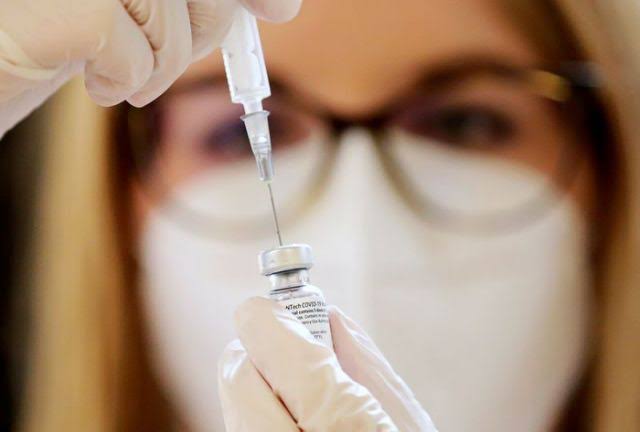German vaccination campaign overshadowed by mishaps
Frankfurt (Reuters) – Germany’s COVID-19 vaccination campaign has been overshadowed by an overdose mishap in the north and problems with the transportation of the vaccine in the south which lead to 1,000 shots being sent back.
Some districts in Bavaria said on Monday they would not use the shots received over the weekend on concerns the vaccines developed by Pfizer and BioNTech may have become too warm during their delivery in household cool boxes, a spokesman for the Lichtenfels district said.
“There were doubts as to whether the cold chain was maintained at all times,” Lichtenfels District Administrator Christian Meissner told Reuters TV.
The vaccine, which uses new so-called mRNA technology, must be stored at ultra-low temperatures of about minus 70 Celsius (minus 94 Fahrenheit) before being shipped to distribution centres in specially designed cool boxes filled with dry ice.
Once out of ultra-low temperature storage, the vaccine must be kept at 2C to 8C to remain effective for up to five days. The cool boxes designed by Pfizer are fitted with GPS trackers so the companies can deal with potential storage issues en route.
While BioNTech takes responsibility for the transport to the deep freezer hubs, local authorities are tasked with providing safe and cooled transport to the individual vaccination centres.
The vaccines arrived in Lichtenfels and six other northern Bavarian districts on Saturday in cool boxes of the type used for picnics or camping trips. The temperature loggers in some cases showed interim temperatures of up to 15C.
“BioNTech commented and said that the vaccine was probably okay, but probably okay is not enough,” Meissner said, adding that the shots would not be used to prevent damage to the public’s trust in the vaccination campaign.
According to the government of Upper Franconia, where the districts are based, BioNTech had told it: “Based on of the facts presented by you in your email of 12-27-2020 at 19.52 and internal stability data we do not see any influence of the described transport deviation on the quality of the vaccine shots concerned.”
BioNTech declined to comment.
After consulting with the Bavarian Health Ministry, the districts decided not to use the 1,000 shots earmarked for use in Lichtenfels as well as Coburg, Kronach, Kulmbach, Hof, Bayreuth and Wunsiedel, also in northern Bavaria, the Lichtenfels spokesman said.
Local medical staff had said that they would not feel comfortable using the shots, he said, adding that a new batch of vaccine shots arrived on Monday perfectly cooled and that the vaccination campaign started one day late.
Elsewhere in Germany, in the Vorpommern-Ruegen district, authorities said eight workers in an elderly care home in Stralsund city received five times the recommended dose of the BioNTech/Pfizer vaccine on Sunday.
Four went to hospital for observation after developing flu-like symptoms.
“I deeply regret the incident. This individual case is due to individual errors. I hope that all those affected do not experience any serious side-effects,” district chief Stefan Kerth said in a statement.
Vorpommern-Ruegen authorities pointed to previous statements by BioNTech saying larger doses were tested in the Phase I study without serious consequences.
BioNTech pointed to the vaccine’s package insert, which says that in the event of overdose, monitoring of vital functions and possible symptomatic treatment is recommended.



